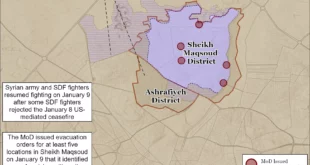Syria has expressed readiness to help curb Middle East instability in exchange for peace with Israel but will not easily give up its alliance with Iran as demanded by the Jewish state.Analysts say Damascus, which wants to reach a peace deal with Israel under which it regains the Golan Heights and eases its isolation from the West, is reluctant to sacrifice its strong ties with Tehran before peace talks even start.
Negotiations between Syria and Israel collapsed in 2000 without resolving the fate of the Golan, a mountainous plateau occupied by Israel in 1967 and annexed in 1981 in a move declared null by the United Nations Security Council.
“Syria wants a resumption of talks without paying the price Israel is demanding. From the Syrian perspective why should ties with Iran be a negotiating card?” said Mohammad Muslih, professor of politics at Long Island University.
“Does Syria ask Israel to reconsider its alliance with the United States?” added Muslih, a longtime confidant of the Syrian government who recently met Syrian officials in Damascus.
Israeli Prime Minister Ehud Olmert said his country is willing to talk peace with Damascus but wants Syria to sever ties with Iran and the groups Hizbollah and Hamas.
Muslih said Damascus would resist any pressure to cut those links as a precondition for talks, but predicted that if Israel made concessions in peace negotiations, Syria would be “more than willing” to change the nature of its relationship with Iran.
It would also be ready to cooperate directly with Washington in helping to curb violence in neighbouring Iraq, and could help promote Israeli-Palestinian peace talks, he said.
“Once we have negotiations between Syria and Israel, Syria will be more than willing to make arrangements with Washington concerning Iraq. The same applies to Lebanon,” said Muslih.
Iran ties ‘tactical’
Unlike the rest of the Arab world, Syria was quick to establish ties with the clerical government in Iran after the 1979 Islamic Revolution and backed Iran when it was invaded by Iraq a year later.
In recent years the secular government in Damascus has reinforced links with the Islamic Republic as the two countries sought to counter US efforts to isolate them.
The closer alliance has further worsened ties between Damascus and Washington, Israel’s chief ally. Washington imposed sanctions on Damascus in 2004.
Today, Syria is trying to draw Iranian investment and the two countries coordinate closely in backing Hizbollah and Hamas groups in Lebanon and the Palestinian territories — an alliance which Syria believes has brought it strategic gains.
Hizbollah held its own in its 34-day war with last year and Hamas won Palestinian parliamentary elections, before seizing power by force in Gaza earlier this month.
“I don’t think that we have reason to believe that there is anything on the cards right now that would make the marriage between Iran and Syria break,” said Rime Allaf, associate fellow at London’s Chatham House.
Nevertheless, Syrian officials privately say the alliance is “tactical”, and they have criticised the US invasion of Iraq as a strategic error that raised Iran’s influence in the region.
“Our relations with Iran are strong, but we do not hesitate to tell the Iranians you’re wrong when they are,” Syrian Vice President Farouq Sharaa said last week. Thabet Salem, a leading Syrian journalist, said Syria would happily ditch its alliance with Iran if the United States supported the talks.
“Syria will break this so called strategic alliance with Iran if its economy booms, American sanctions are lifted and the Golan returns,” he said.
Regaining the Golan jumped back to take centre stage in Syrian foreign policy after Syria was forced to withdraw its forces from Lebanon two years ago and US-led pressure on Damascus for its role in Iraq and Lebanon mounted.
But with US President George W. Bush showing no enthusiasm for an Israeli-Syrian peace deal, little change in the nature of ties between Damascus and Tehran is expected in the short term.
Sharaa added he was not optimistic about the prospects for peace, partly because of a lack of US support.
 Eurasia Press & News
Eurasia Press & News


